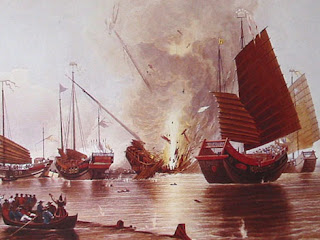Here are the Photos, Maps and Documents for the three stations on British Imperialism.
British Imperialism In Africa
British Imperialism in China

British Imperialism In Africa
British Imperialism in China
Chinese Tea

 |
| Chinese Porcelain |
 |
| Chinese Si |
 |
| Opium Addict |
 |
| The Opium Wars Between the British and the Chinese |
Emperor of China Qian Long:
Letter to King George III of England
1793
Introduction:
Qian Long ruled China from 1735 to 1795. This was the last period in which China was strong enough to resist external influence. Here are excerpts of a letter he sent in response to a request from George III of Britain for trade privileges.
You, O King, live beyond……many seas…….Your Envoy has crossed the seas and paid his respects at my Court on the anniversary of my birthday……..As to your entreaty (request) to send one of your nationals (citizens)……to be in control of your country's trade with China, this request……..cannot possibly be entertained.
……Europeans have been permitted to live at Peking (China), but they are compelled to adopt Chinese dress, they are strictly confined to their own precincts and are never permitted to return home.
……As your Ambassador can see for himself, we possess all things. I set no value on objects strange or ingenious, and have no use for your country's manufactures……
……our Celestial Empire (China) possesses all things in prolific abundance and lacks no product within its own borders. There was therefore no need to import the manufactures of outside barbarians in exchange for our own produce. But as the tea, silk and porcelain which the Celestial Empire (China) produces, are absolute necessities to European nations and to yourselves…….
…..Should your vessels touch the shore, your merchants will assuredly never be permitted to land or to reside there, but will be subject to instant expulsion. In that event your barbarian merchants will have had a long journey for nothing. Do not say that
From E. Backhouse and J. O. P. Bland, Annals and Memoirs of the Court of Peking (Boston: Houghton Mifflin, 1914), pp. 322331
British Imperialism in India

 To sum up the whole, the British rule has been – morally, a great blessing; politically peace and order on one hand . . . on the other, materially, impoverishment . . . The natives call the British system . . . “the knife of sugar.” That is to say there is no oppression, it is all smooth and sweet, but it is the knife, nevertheless.
To sum up the whole, the British rule has been – morally, a great blessing; politically peace and order on one hand . . . on the other, materially, impoverishment . . . The natives call the British system . . . “the knife of sugar.” That is to say there is no oppression, it is all smooth and sweet, but it is the knife, nevertheless.

Document 1
Source: The Economic History of India Under Early British Rule by Romesh Dutt, 1908
Englishmen . . . have given the people of India the greatest human blessing – peace. They have introduced Western education. This has brought an ancient and civilized nation in touch with modern sciences, and modern life. They have built an administration that is strong and efficient. They have framed wise laws and have established courts of justice.
Document 2
Source: Speech by Dadabhai Naoroji, 1857
Document 3
Source: Speech by Dadabhai Naoroji, 1857
Europeans [the British] occupy almost all the higher places in every department of government . . . Natives, no matter how fit, are deliberately kept out of the social institutions started by Europeans . . . All they [the Europeans] do is live off of India while they are here. When they go, they carry all they have gained.













.bmp)



























No comments:
Post a Comment